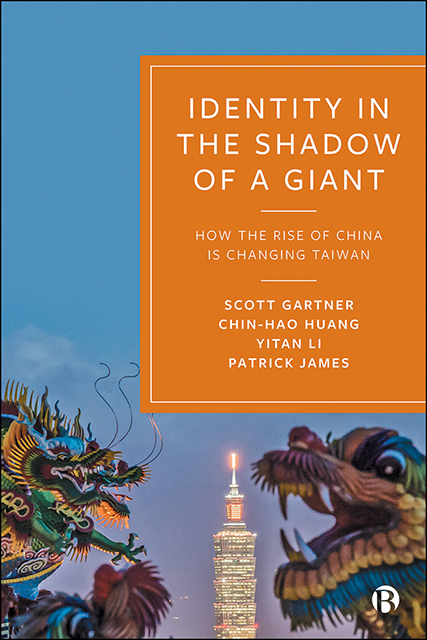Book contents
- Frontmatter
- Dedication
- Contents
- List of Figures and Tables
- About the Authors
- Acknowledgements
- Preface
- 1 Identity in the Shadow of a Giant: How the Rise of China Is Changing Taiwan
- 2 Taiwan in Historical Perspective
- 3 The Problématique of Taiwanese Identity
- 4 Theorizing about Identity, Change in Capabilities and Dyadic Relations: An Approach Based on Analytic Eclecticism and Systemism
- 5 Elite Reflections
- 6 Popular Reflections (Survey I)
- 7 Factors Influencing Identifying Only as Taiwanese: A Layered Empirical Approach (Survey II)
- 8 A New Vision of Taiwanese Identity, the Rise of China, Cross-Strait Relations and the United States in Northeast Asia
- Appendix A Research Interview Questions, September–October 2015
- Appendix B Taiwanese Identity and the Rise of China: Survey Questions, 27 October 2015
- Appendix C Taiwan National Security Survey by Emerson Niou
- References
- Index
4 - Theorizing about Identity, Change in Capabilities and Dyadic Relations: An Approach Based on Analytic Eclecticism and Systemism
Published online by Cambridge University Press: 15 April 2023
- Frontmatter
- Dedication
- Contents
- List of Figures and Tables
- About the Authors
- Acknowledgements
- Preface
- 1 Identity in the Shadow of a Giant: How the Rise of China Is Changing Taiwan
- 2 Taiwan in Historical Perspective
- 3 The Problématique of Taiwanese Identity
- 4 Theorizing about Identity, Change in Capabilities and Dyadic Relations: An Approach Based on Analytic Eclecticism and Systemism
- 5 Elite Reflections
- 6 Popular Reflections (Survey I)
- 7 Factors Influencing Identifying Only as Taiwanese: A Layered Empirical Approach (Survey II)
- 8 A New Vision of Taiwanese Identity, the Rise of China, Cross-Strait Relations and the United States in Northeast Asia
- Appendix A Research Interview Questions, September–October 2015
- Appendix B Taiwanese Identity and the Rise of China: Survey Questions, 27 October 2015
- Appendix C Taiwan National Security Survey by Emerson Niou
- References
- Index
Summary
Overview
This chapter theorizes about identity, change in capabilities and dyadic relations. The frame of reference for this work combines analytic eclecticism and systemism. Analytic eclecticism guides assembly of causal mechanisms into an integrated whole, while systemism – a means towards visual representation of hypotheses – provides the method. The intended empirical domain of application concerns Taiwanese (and to some extent Mainland Chinese) identity, the dramatic rise of the PRC, dyadic cross-Strait relations, and the role of the US as the key ingredient from outside of Northeast Asia.
Why bother with analytic eclecticism and systemism in the turn towards theorizing? Consider, as the obvious alternative, implementation of a particular school of thought as the foundation for theory. Carried out in Chapter 3, a review of paradigmatic research reveals that realist and liberal perspectives, while offering a range of insights, are not sufficient to explain the dynamics of the rise of China, cross-Strait relations, Taiwanese identity and US influence. Thus, attention turns to analytic eclecticism as a guide for assembly of causal mechanisms from diverse points of origin (Sil and Katzenstein, 2010a, 2010b). Our approach emphasizes theorizing that is inclusive, notably going beyond paradigmatic boundaries. Analytic eclecticism also stresses the importance of relevance to policy.
Analytic eclecticism is not without its limitations. An important shortcoming of analytic eclecticism in its original form is the potential for research findings to lack coherence because there no longer is a paradigm to guide investigation. To head off the problem of contradictory theorizing and evidence, systemism is incorporated into the process. Systemism is a graphic technique for representing causal mechanisms in a logically consistent and comprehensive way (Bunge, 1996; see also James, 2012, 2019a, 2019b; Pfonner and James, 2020). The principal result of this chapter is a diagrammatic exposition of cause and effect, based on research reviewed in Chapter 3, which connects Taiwanese identity, the rise of China, cross-Strait relations, and the role of the US. This graphic version of what is known so far provides a baseline of expectations, upon which research in this volume will build. The combination of analytic eclecticism and systemism is also an attempt to extend the effort made by Yu (2017) to broaden and deepen the methodological approach to study China.
Work proceeds in four additional sections.
- Type
- Chapter
- Information
- Identity in the Shadow of a GiantHow the Rise of China is Changing Taiwan, pp. 65 - 90Publisher: Bristol University PressPrint publication year: 2021



